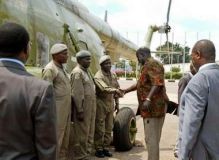Probe blames pilot for Garang crash
April 5, 2006 (KHARTOUM) — An official probe into the helicopter crash that killed former south Sudanese leader John Garang last year concluded the pilot was to blame, a member of the investigation panel said Wednesday.

|
|
First Vice-President John Garang shakes hands with crew members as he boards an Ugandan helicopter at Entebbe International Airport on his way to meet Uganda’s President Yoweri Museveni at his country home in Mbarara, western Uganda in July 29, 2005. (Reuters). |
Siraj al-Din Hamid told reporters in Khartoum that the final report was submitted to Sudanese President Omar al-Beshir on Tuesday night and could be officially published on April 14.
He said one of the main causes of the crash on July 30, 2005 of the helicopter carrying then First Vice President John Garang was the pilot’s insistence to apply visual flying rules in bad weather.
“The plane was flying at low altitude and the pilot was applying visual flying rules instead of using onboard instruments while it was dark and the weather was bad and cloudy,” Hamid said.
He also cited the lack of adequate planning, poor knowledge of the area and the failure by the pilot and co-pilot to make the right decisions in rough weather as contributing factors.
A total of 14 people were killed when the Russian-made Ugandan presidential helicopter crashed in a mountainous region in southern Sudan.
Citing the many crashes in which senior military officials have died over recent years, many southerners accused Beshir of engineering the assassination of the former rebel chief but the report ruled out foul play.
Garang died only days after moving to Khartoum to assume his new position as first vice president and was the emblematic figure of the January 2005 peace deal that ended 21 years of deadly north-south civil war.
The official publication of the report on the crash was initially expected several months earlier. The international panel was chaired by former Sudanese vice president Abel Alier and the black boxes were analysed in Russia.
Hamid said the final report had yet to receive the Sudanese and Ugandan governments’ stamp of approval before being released.
(ST/AFP)
